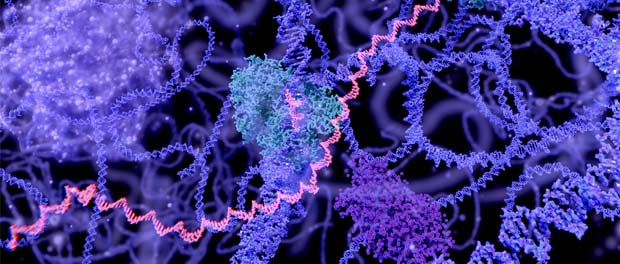
A person’s genetic code can contribute to their risk for developing non-small cell lung cancer (NSCLC), which accounts for about 85% of lung cancers. Epigenetics, the study of chemical tags that impact gene expression without altering the genetic sequence, is shown to also profoundly influence the development of cancer. In a study by Asan Medical Center researchers from The University of Ulsan College of Medicine in Korea, chromatin immunoprecipitation (ChIP)-on-chip assays and other techniques were used to investigate the epigenetic influence a histone deacetylase (HDAC) inhibitor drug, CG200745, could have on genes involved in this type of cancer. Ultimately, their findings could lead to the development of an epigenetic-based cancer treatment.
Histones are proteins surrounded by DNA that are involved in epigenetic changes and centrally implicated in the expression of genes. HDAC inhibitors (HDACi) are growing in popularity as a viable class of molecules that could potentially combat the development of cancer by inhibiting the activity of certain histone deacetylases and thereby affecting the expression of cancer-related genes.
The group of researchers conducted in vitro studies using HDAC inhibitor CG200745 to try to destroy non-small cell lung cancer. The study’s lead author, Dr. Sung-Min Chun, said, “Our results suggest that the HDAC inhibitor CG200745 causes epigenetic reactivation of critical genes that are transcriptionally suppressed in cancers, and therefore can be a promising NSCLC cancer therapeutic.”
Overall, the researchers utilized chromatin immunoprecipitation (ChIP)-on-chip assays and two other experimental techniques known as real-time PCR and western blotting. Chromatin immunoprecipitation in conjunction with DNA microarray (known as ChIP-on-chip) was used to pinpoint DNA-protein interactions in vivo while real-time PCR and western blotting gave the group insight into protein amounts within cells and mRNA expression.
Using a western blot, they found that histone acetylation of H3 and H4 at numerous different sites, including H3K9 and H4K16, was increased as a result of the drug. Treatment with this drug caused an overall rise in global histone acetylation, which led to the inhibition of cell proliferation.
A chromatin immunoprecipitation method was utilized to investigate the genes that were affected by histone acetylation as a result of CG200745 treatment. Chromatin immunoprecipitation, or ChIP, is used to investigate whether a protein binds to a particular DNA sequence to elucidate DNA-protein interactions and pinpoint a specific genomic region to which certain proteins bind. The researchers were able to determine which genes and how many related to H4K16ac were affected and they could observe the anti-cancer effects of this HDACi.
“HDAC inhibitor molecules have been reported to induce a range of anticancer effects, including tumor cell apoptosis, cell cycle arrest, differentiation, senescence, modulation of immune responses, and altered angiogenesis,” explained Dr. Chun. Their results indicated that “HDAC inhibitor treatment induced the inhibition of lung cancer cell growth, cell growth arrest, and apoptosis… at comparable IC50 concentrations to that of SAHA (also known as vorinostat), the only HDAC inhibitor currently approved for the clinical treatment of cutaneous T-cell lymphoma.”
Although future research is needed, this study investigated new avenues for lung cancer treatment, using chromatin immunoprecipitation and other techniques to demonstrate that CG200745 inhibits cell growth by epigenetically modifying genes critical for cancer cell survival. In light of these results, HDACi drugs may be a promising therapeutic for people diagnosed with NSCLC as epigenetic-based drugs become a more acceptable chemotherapeutic for combating lung cancer and many other cancers.
CG200745 is currently in the first phase of clinical trials assessing its effects alone and in conjunction with another anticancer drug. Promising results demonstrate success with tumor cells in several cancers including prostate cancer, colon carcinoma, and renal cell carcinoma.
Source: Chun, S., Lee, J., Choi, J., Lee, J., Hwang, J.J., Kim, C., Suh, Y., Jang S.J. (2015). Epigenetic Modulation with HDAC Inhibitor CG200745 Induces Anti-Proliferation in Non-Small Cell Lung Cancer Cells. PLoS ONE, 10(3): e0119379.
Reference: Newman, M. HDAC Inhibitors Battle NSCLC Cells in New Study. Lung Cancer News Today. 21 July 2015. Web.


